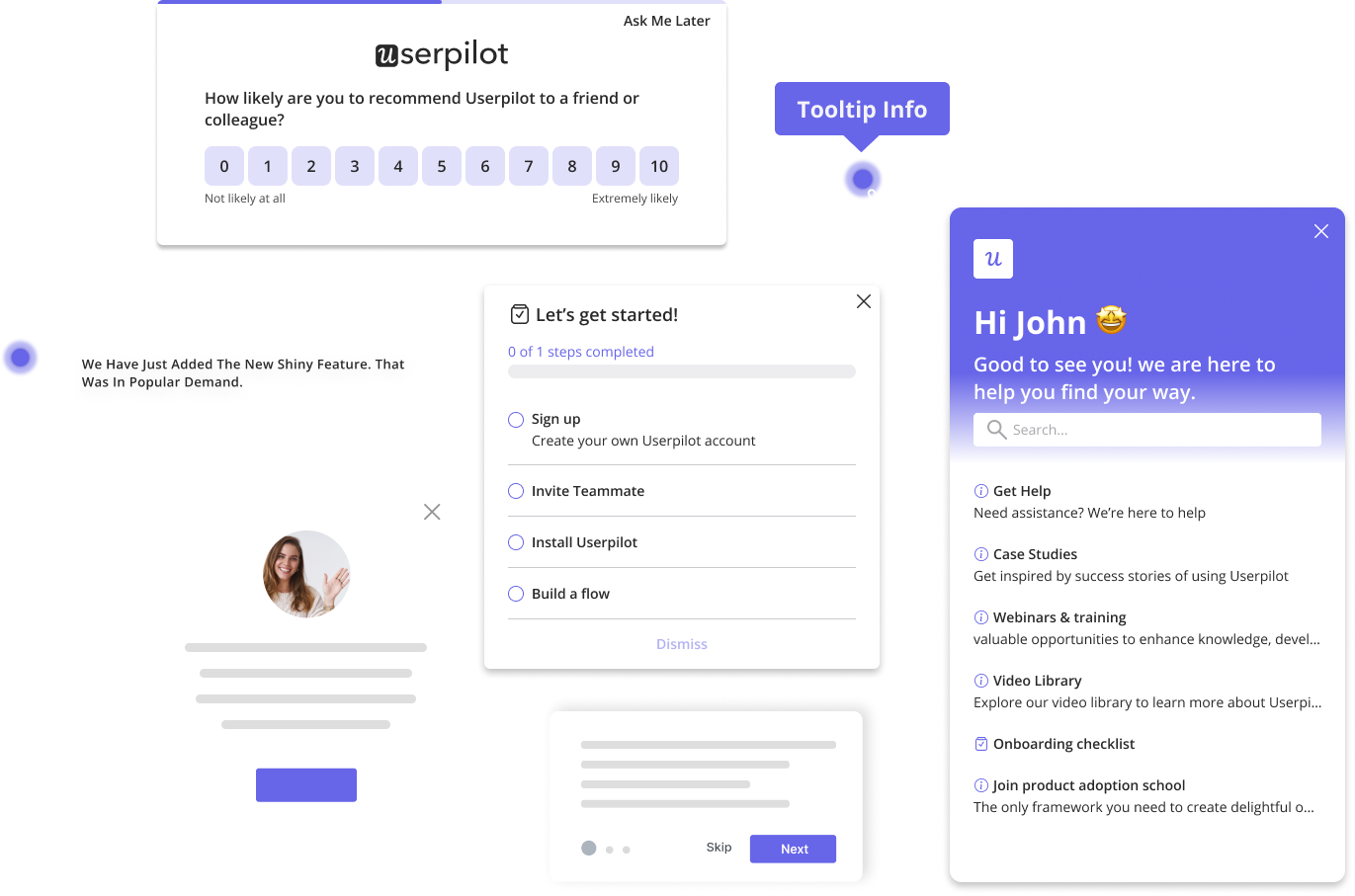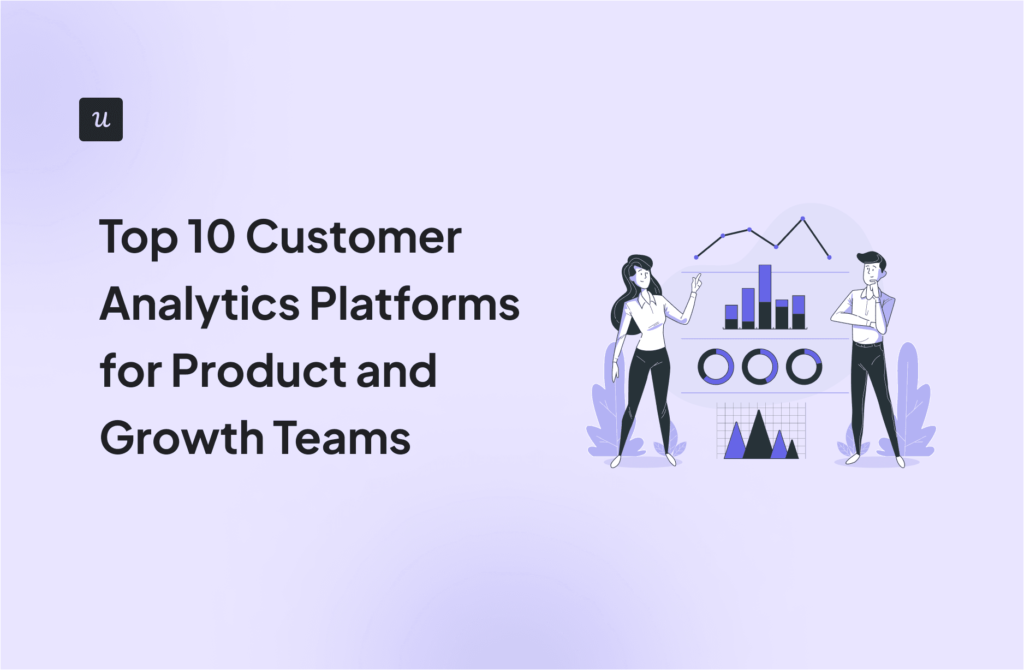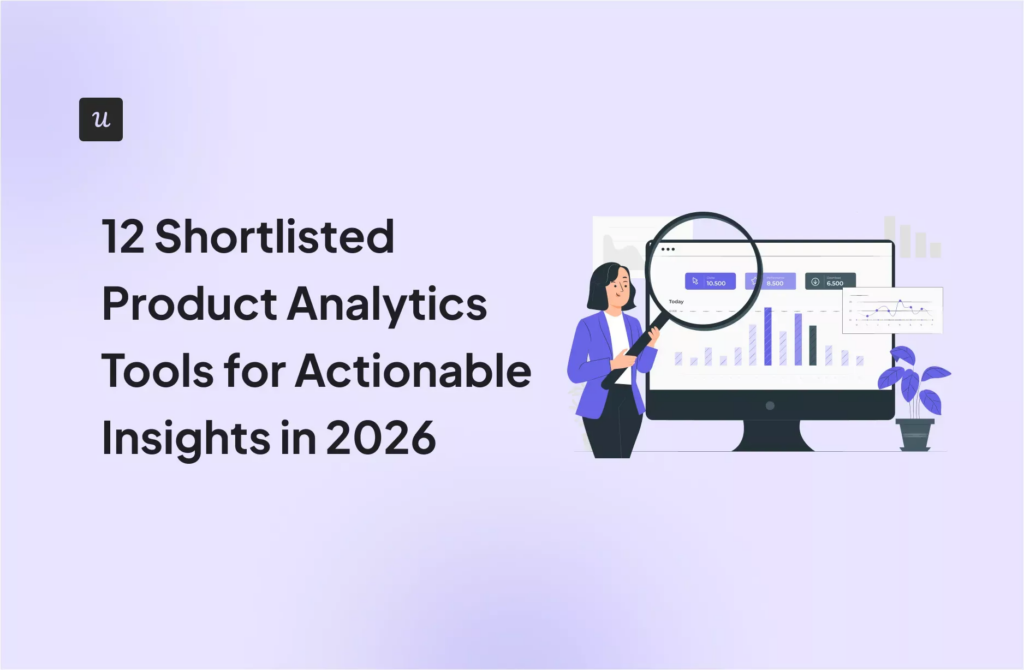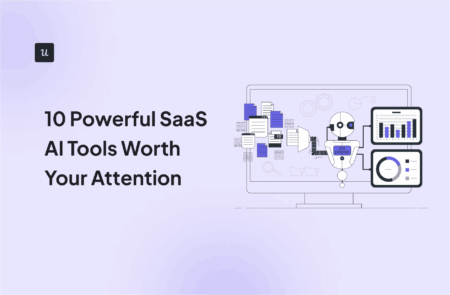
Over 60% of enterprise SaaS platforms now include embedded AI features. Generative AI adoption has doubled to 65% from 2023 to 2024. And in the past year, 56% of SaaS companies launched or tested AI features in their products, of which 41% are already monetizing them.
This sudden explosion in SaaS AI tools aligns perfectly with Gartner’s hype cycle, which describes how many tools surge in popularity before fading, as early experiments fail to deliver results. Ultimately, only a fraction make it past the “Trough of Disillusionment” to become lasting, high-impact solutions.
In this article, I focus on exactly those select few artificial intelligence (AI) solutions that can give you a competitive edge long after the initial hype dies down.
What’s your primary goal with SaaS AI tools?
How do you want to drive that growth?
Which internal area needs the most improvement?
What’s the top priority for your GTM teams?
You’re ready to level up with the right SaaS AI tools!
Based on your answers, it looks like you’re ready to drive significant results. See how Userpilot’s powerful AI features can help you achieve your goals.
Try Userpilot Now
See Why 1,000+ Teams Choose Userpilot

TL;DR: 10 Best AI tools for SaaS businesses
To create this list, I focused on a few key questions:
Does the tool solve a meaningful problem for SaaS providers, like growth, support, or analytics? Can it fit seamlessly into existing business operations without unnecessary complexity? And finally, can it securely handle sensitive data?
I excluded tools that felt like basic add-ons, lacked strong privacy practices, or solved problems too niche to be broadly useful. Here’s an overview of the AI SaaS tools that made the cut.
| Tool | G2 Rating | Best For | Pricing |
|---|---|---|---|
| Userpilot | 4.6 | Driving PLG with in-app guidance, analytics, & automation. | $299/month (Starter); Custom pricing (Growth); |
| ClickUp AI | 4.7 | Centralizing project management & team collaboration. | $7/user/month (Unlimited); $12/user/month (Business) |
| Gong | 4.7 | Sales intelligence & revenue optimization via call analysis. | $250/user/month + $5,000-$50,000 (platform fees) |
| Whatagraph IQ | 4.5 | Automating marketing analytics & creating client-ready reports. | $229/month (Start); $579/month (Boost) |
| Applitools | 4.4 | Visual UI testing & maintaining design consistency. | $969/month (Starter) |
| Shopify Sidekick | 4.4 | Automating e-commerce store management. | $19/month (Basic); $49/month (Grow);$229/month (Advanced) |
| Tonic.ai | 4.2 | Generating realistic synthetic data for development & testing. | $199/month (Structural); $299/month (Fabricate) |
| ChatGPT Business | 4.7 | Workflow automation & AI-powered data analysis. | $25/seat/month |
| Slack AI | 4.5 | Knowledge discovery & summarization within team conversations. | $7.25/user/month (Pro); $15/user/month (Business) |
| Unbabel | 4.6 | Multilingual customer support with human-in-the-loop AI translations. | $0.00020/word (Pay-as-you-go); $0.00018/word (Starter); $0.00017/word (Standard) |
AI in SaaS 101: The basics
AI tools help SaaS companies make data-driven decisions, automate repetitive tasks, and improve user experiences.
For instance, Intercom uses AI chatbots to resolve common customer support questions instantly, freeing teams to handle more complex issues. Meanwhile, in data analytics, Mixpanel applies AI to predict churn and flag at-risk accounts before they cancel.
For marketing, HubSpot’s AI personalizes campaigns by segmenting based on user behavior. And for in-app guidance, Userpilot’s generative AI-writing assistant uses natural language processing to create messages that match my brand voice.
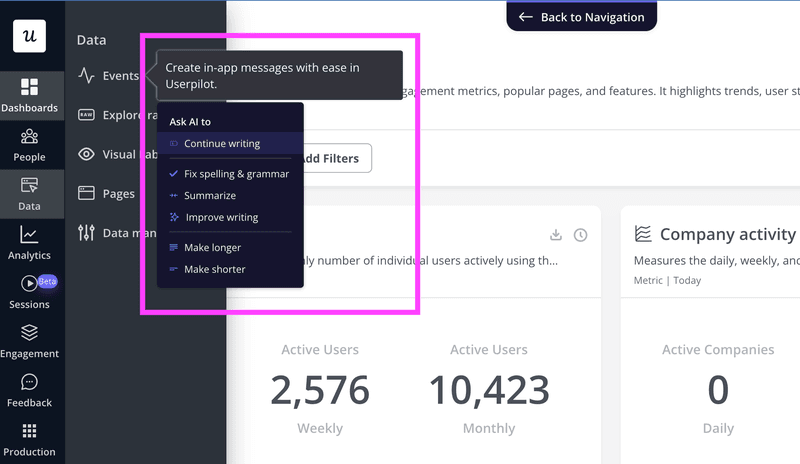
For improving global reach, Userpilot’s AI-powered localization auto-translates resource center materials and in-app messages.
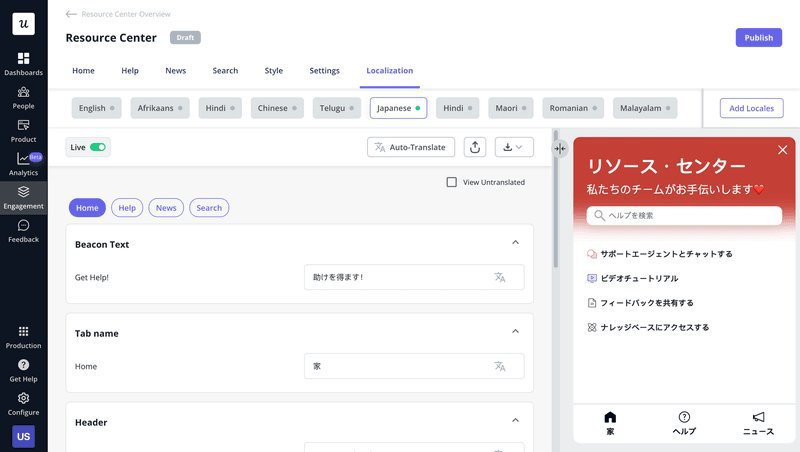
Most SaaS teams have adopted AI in one way or another. And while the new technology is exciting, it’s important to keep ethics front and center as we continue innovating.
What are the ethical considerations of AI-powered SaaS tools?
While AI technology creates incredible opportunities, it also comes with risks SaaS platforms should address:
- Compliance and security: AI systems process sensitive customer data. Therefore, companies must follow strict privacy laws, like GDPR, to maintain secure information handling.
- Biased algorithms: Machine learning algorithms trained on biased data can produce inaccurate or biased outcomes, harming user trust and decision-making.
- Ignoring user concerns: Rushing AI launches just to “have AI” without a clear GTM plan, proper testing, or communication leads to poor user experiences and loss of trust. To learn how experts launch AI features amidst all the hype, join us at the upcoming Product Drive event.
In short, handled poorly, AI creates unnecessary complexities and wastes resources. In the next section, we’ll look at SaaS AI tools that avoid this chaos by strategically using AI for scalable use cases.
My shortlist of the 10 best AI SaaS solutions (by use case)
I’ve narrowed down the crowded AI SaaS landscape to 10 tools that deliver measurable value. These cover areas such as product growth, project management, reporting, e-commerce operations, and more.
1. Userpilot: Best for future-ready product growth automation
Userpilot is a product growth platform that helps product teams build in-app experiences, collect feedback, and track user behavior across web and mobile.
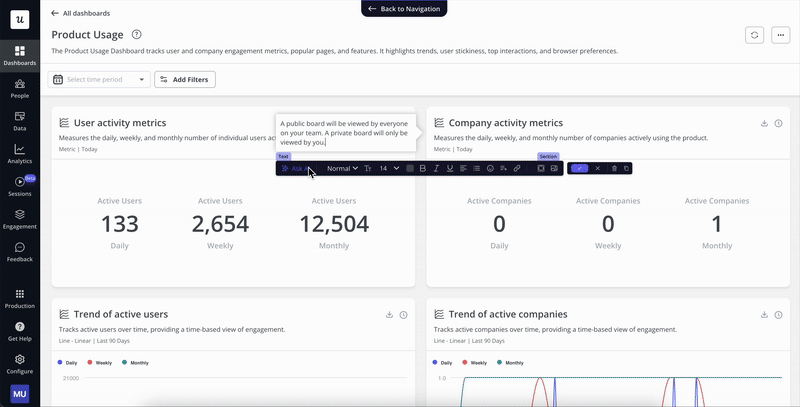
Standout features:
Currently, Userpilot offers an AI writing assistant and AI-powered localization.
But soon, we’re launching the Product Growth Manager Agent: an AI that autonomously manages entire projects, not just individual tasks.
This agent will analyze product-wide data and insights, detecting issues like drop-off points or low feature adoption. After problem identification, the AI will propose a solution by automatically creating in-app flows or surveys. I can then approve the suggestion or request edits. From there, the AI monitors performance and impact on metrics, optimizing its approach over time to drive better results.
With multi-strategy capabilities, the AI agent will simultaneously run multiple “Playbooks”, like onboarding, feature adoption, or PLG. Each Playbook can target specific projects, such as fixing friction points or accelerating time-to-value.
The Product Growth Manager Agent will have 3 modes:
- Observe: It watches and learns.
- Copilot: It assists you with suggestions and execution.
- Autonomous: It fully owns and optimizes parts of the user journey by itself.
Pros:
- No-code builder: Use Userpilot’s Chrome extension to build in-app flows, tag features, and customize UI elements without any coding.
- Advanced in-app analytics: Track customer interactions, monitor flow performance, and build behavior-based segments using robust product analytics.
Cons:
- Learning curve: Using advanced features and setting up complex flows requires some time to learn.
- Limited native integrations: Userpilot supports all major tools, but some users wish it had more direct integrations.
Pricing:
- Starter: From $299/month for up to 2,000 MAUs.
- Growth: Custom pricing.
- Enterprise: Custom pricing.
2. ClickUp AI: Best for internal project management
ClickUp AI combines project management, documentation, and team collaboration into a single workspace. It uses AI software to automate updates, generate summaries, and surface insights to keep projects on track.
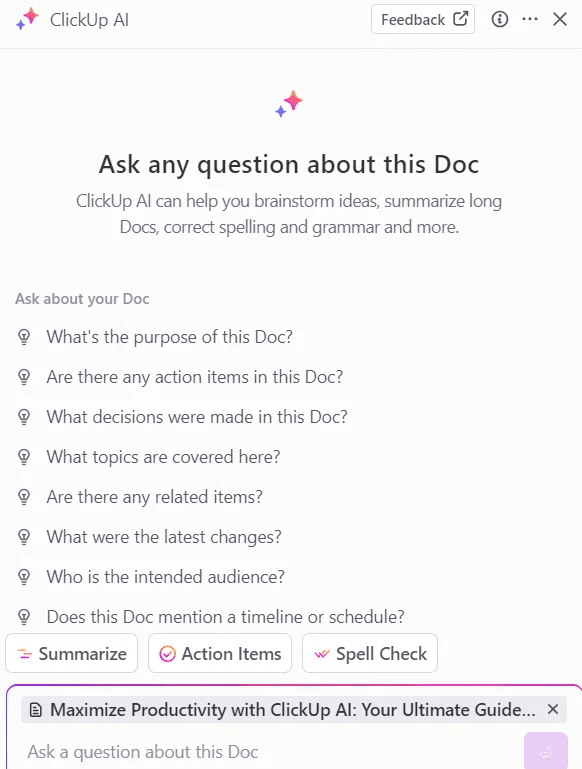
Standout features:
- ClickUp Brain: Acts as a neural network that connects tasks, documents, and people to deliver contextual, role-specific insights.
- Interactive Q&A: I can ask questions anywhere in ClickUp and get instant answers based on workspace data.
- Autopilot agents: Handle repetitive tasks, such as updating project statuses, assigning tasks, and sending standup updates.
- Deep Search: Helps me find hard-to-locate information across ClickUp or connected tools like Google Sheets and GitHub.
- AI writing assistant: Generates contextual content for project updates or documentation. And the notetaker automatically transcribes meetings, links notes to related tasks, and extracts action items.
- AI summariser: Condenses lengthy discussions and threads into readable progress reports.
Pros:
- Task automation: Autopilot Agents reduce manual work and repetitive updates, freeing up time.
- Cost-effective AI add-on: Much cheaper than using separate AI-powered project management tools.
Cons:
- Complex setup: Custom workflows and AI automations take time to configure.
- Accuracy check needed: AI summaries and insights may need human review before sharing.
Pricing:
Out of the following pricing tiers, only the paid subscriptions include ClickUp AI:
- Free forever: Does not include AI features.
- Unlimited: From $7/user/month.
- Business: From $12/user/month.
- Enterprise: Custom pricing.
3. Gong: Best for AI-powered revenue intelligence
Gong is a revenue AI platform designed to help GTM teams analyze sales interactions to inform smarter deal decisions, coaching, and forecasting.
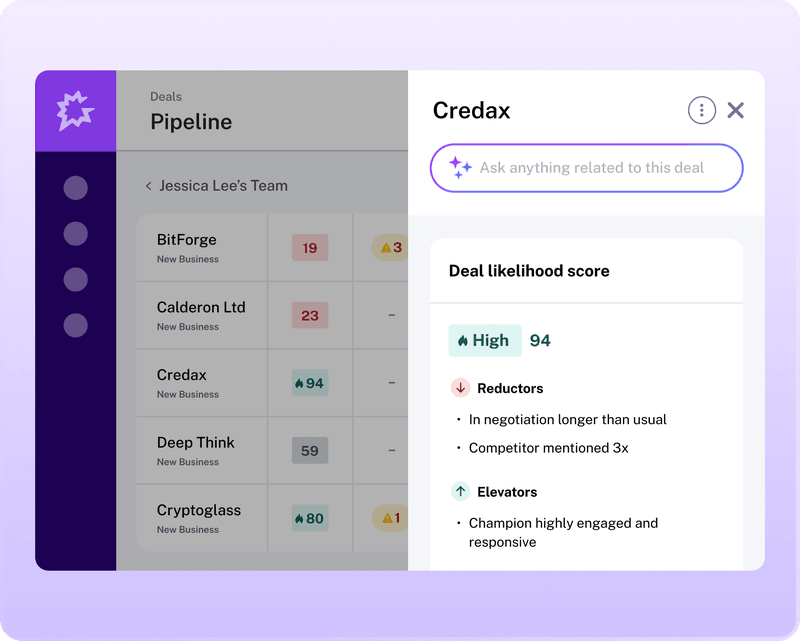
Standout features:
- Proprietary in-house AI models: Used to capture and analyze sales interactions across calls, emails, and meetings. The AI then sifts through unstructured conversation data to uncover actionable insights about deal risk, win-drivers, and coaching opportunities.
- Smart Trackers: Go beyond basic keyword matching, detecting nuanced concepts and signals to improve accuracy.
- AI Methodology Playbooks: Guide reps to follow chosen sales frameworks step by step.
- AI Scorecard Suggestions: Automatically highlight areas for coaching. Meaning managers can provide targeted feedback faster.
- Call Spotlight: Pinpoints the critical parts of any recorded call, saving managers from listening through full recordings.
- Deal Likelihood Scores: Lastly, these predict which opportunities are most likely to close, so teams can focus where it matters most.
Pros:
- Standardized execution: AI Playbooks maintain consistent application of sales methodologies across teams.
- Faster coaching: AI-generated scorecard suggestions streamline manager feedback and rep improvement.
Cons:
- Steep learning curve: Complex setup and keyword tracker configuration require heavy RevOps involvement and lengthy onboarding.
- High costs: Platform fees, per-user licenses, and onboarding costs quickly add up, making Gong expensive for mid-market teams.
Pricing:
Gong doesn’t publish its pricing. But industry analysts report it uses a complex three-part pricing model, which looks something like this:
- Platform fee: $5,000–$50,000 annually, depending on team size.
- Per-user license: $250/user/month.
- Onboarding services: $7,500-$20,000 for a 50-person sales team.
4. Whatagraph IQ: Best for client-facing marketing reports
Whatagraph is a marketing intelligence platform that turns complex marketing data into actionable reports. It helps agencies and marketing teams centralize analytics, automate reporting, and share insights without needing advanced technical skills.
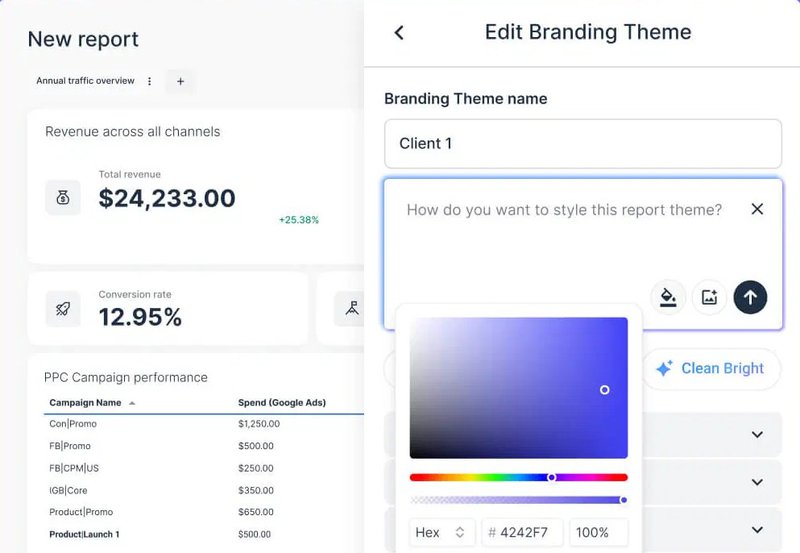
Standout features:
- AI report generator: Whatagraph IQ can build multi-tab reports from a single prompt, pulling the right metrics and applying filters automatically. IQ also helps style reports to match my brand by using a custom prompt, selecting a primary color, or uploading an image for inspiration.
- IQ Chat: Works like a personal data assistant, letting me ask questions in plain language and instantly get answers based on live data.
- AI text summaries: Generate clear, written performance insights for each widget or report.
- IQ Plus: Keeps these summaries updated automatically as date ranges change. It also helps me organize and normalize data by generating custom dimensions, like grouping campaign names by category.
Pros:
- Intuitive builder: Drag-and-drop widgets make dashboards quick to assemble.
- White labeling: Customize reports with your own branding and design, giving clients a polished experience.
Cons:
- Insufficient integrations: With only 55 integrations, it falls short for mid-to-enterprise SaaS teams needing to connect multiple tools.
- Adoption challenges: If your team isn’t already familiar with Whatagraph, introducing it as a new tool into your workflow can lead to pushback or resistance.
Pricing:
Out of the following pricing tiers, only the paid subscriptions include Whatagraph IQ:
- Free forever: Does not include AI features.
- Start: From $229/month.
- Boost: From $579/month.
- Custom: Custom pricing. Includes Whatagraph IQ+.
5. Applitools: Best for validating UI at scale
Applitools is an AI-powered visual testing platform that automates UI regression checks across browsers and devices, helping teams maintain flawless user interfaces.
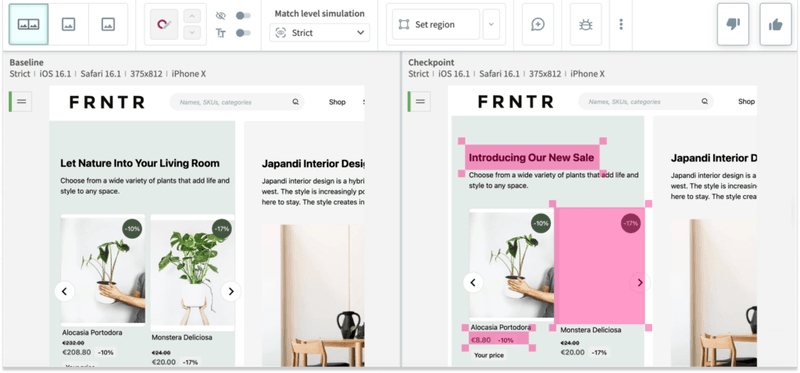
Standout features:
- Applitools Eyes: The Visual AI engine mimics the human eye. It compares the current UI to baseline images and flags important visual defects.
- Ultrafast Grid: The platform runs tests in parallel on the Ultrafast Grid. This feature uses AI to quickly simulate hundreds of browsers, screen sizes, and orientations to catch UI issues in minutes.
- Self-healing tests: Next, self-healing tests apply AI to automatically adjust tests to UI changes, reducing the need for manual maintenance.
- Applitools Autonomous: Finally, this speeds up test creation with natural-language authoring, automated test data generation, and seamless visual API testing.
Pros:
- Broad test coverage: Runs across multiple browsers, devices, and components in parallel.
- Reduced maintenance: Self-healing tests and baseline grouping cut down test upkeep.
Cons:
- Steep learning curve: Advanced AI features and setup can be challenging for new users.
- High cost: With the cheapest plan starting at $969/month, Applitools isn’t accessible for small teams.
Pricing:
- Starter: From $969/month.
- Enterprise: Custom pricing.
6. Shopify Sidekick: Best for ecommerce SaaS operators
Shopify is an ecommerce platform that helps businesses create, customize, and manage online stores while handling payments, inventory, and marketing in one place.
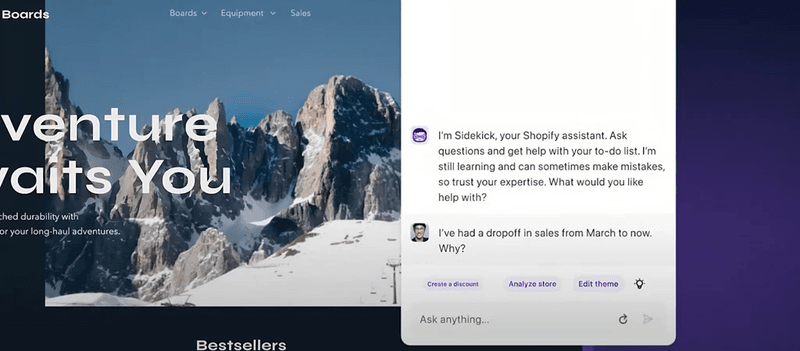
Standout features:
- Built-in AI assistant: Shopify Sidekick is embedded directly in your Shopify admin. It uses natural language processing and machine learning via Shopify Magic to understand commands and act on them. For example, I can type “Set up a 20% discount for hats,” and Sidekick handles it.
- AI content generation: Next, Sidekick helps write product descriptions, email templates, blog posts, and FAQs.
- Smart customer segmentation: Uses AI to analyze store data and help create targeted campaigns and personalized offers for different buyer groups.
- AI-driven recommendations: Finally, Sidekick uses AI to deliver real-time insights on sales performance, product trends, and areas for improvement.
Pros:
- Task automation: Executes complex actions, like creating discounts or updating collections, based on simple language commands.
- Store performance insights: Provides context-aware recommendations for sales trends, segmentation, and marketing actions.
Cons:
- Lack of image editing: The AI tool can’t edit images or visual elements directly. Users still need to do that manually.
- Lacks strategic understanding: Can’t fully grasp your brand vision or voice without detailed guidance, leading to generic outputs.
Pricing:
Shopify Sidekick is included at no extra cost with all the following Shopify plans. However, full access to its capabilities may depend on your plan tier.
- Basic: From $19/month.
- Grow: From $49/month.
- Advanced: From $229/month.
- Plus: From $2,300/month (on a 3-year term).
7. Tonic.ai: Best for AI-powered synthetic data generation for product testing
Tonic.ai is a data platform that generates compliant, production-quality data for software development, testing, and AI model training. So companies can build applications without exposing sensitive customer data.
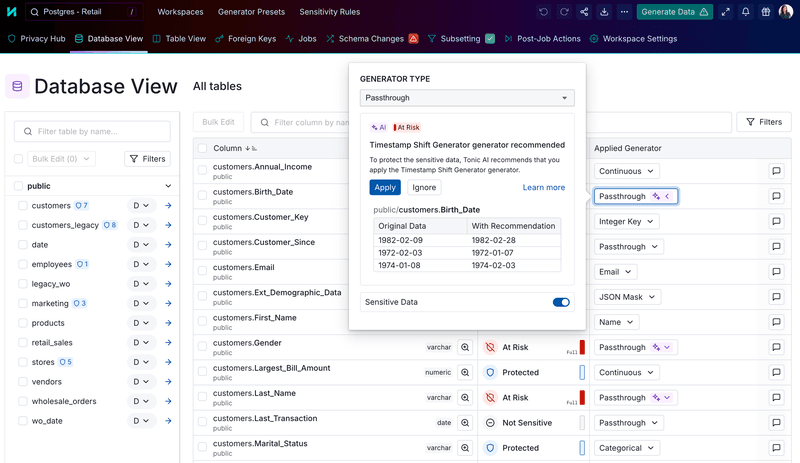
Standout features:
- Fabricate: Generates relational datasets, unstructured content, and mock APIs from scratch based on prompts, schemas, or sample data.
- Structural: Allows us to de-identify, subset, and replicate structured and semi-structured data while preserving referential integrity.
- Textual: Lastly, this de-identifies unstructured data, redacting or synthesizing sensitive information to support compliant use in AI training, LLM workflows, RAG systems, and testing environments.
Pros:
- Flexible generation methods: Supports both building data from scratch and transforming existing datasets, including relational structure and unstructured text.
- Speeds up workflows: Enables faster development and testing, especially for greenfield features or privacy-restricted environments.
Cons:
- Occasional anomalies: Generated datasets sometimes contain unrealistic data points that require manual cleanup.
- Not very intuitive: Complex interface for those unfamiliar with pre-production or test data management.
Pricing:
Each of Tonic’s AI solutions uses a different pricing model.
- Fabricate: Free forever tier available. Professional starts at $299/month for up to 20 tables. Enterprise pricing is custom.
- Structural: Offers a pay-as-you-go option starting at $199/month for 20 tables. Professional and Enterprise plans are custom-priced.
- Textual: Usage-based pricing instead of tiers, billed by words processed.
8. ChatGPT Business: Best for rubber-ducking business processes
ChatGPT Business is a secure, shared workspace that gives teams access to GPT-5 for collaboration, data analysis, and workflow automation.
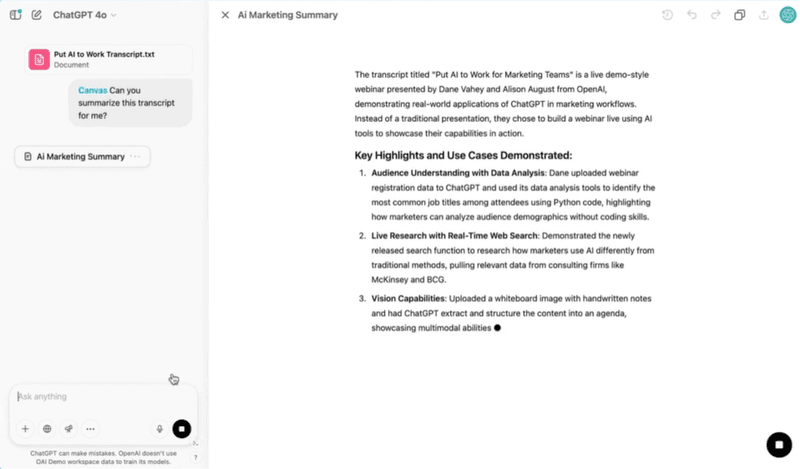
Standout features:
- Powered by GPT-5: ChatGPT Business offers unlimited messages and advanced reasoning capabilities.
- Integrated with workplace tools: Connects to company tools such as Google Drive, SharePoint, and GitHub to deliver context-aware answers based on your internal documents.
- Codex included: A cloud-based coding agent that automates software tasks in a secure environment.
- Centralized workspace: The Business platform also provides a centralized workspace where teams can collaborate on projects, organize tasks, and manage custom GPTs.
- AI-powered data visualizations: Analyze spreadsheets, create charts, and generate reports directly within ChatGPT.
Pros:
- Advanced AI access: Unlimited GPT-5 messages with deep research and complex reasoning.
- Customizable answers: Connects to internal sources for context-aware, relevant responses.
Note: Business data is encrypted in transit and at rest and excluded from model training by default. However, sensitive customer information should still be handled carefully, in accordance with security and data governance policies.
Cons:
- Initial setup complexity: Some features, such as custom GPTs and Codex, may require technical know-how to configure.
- AI hallucinations: ChatGPT can hallucinate or generate incorrect information. So teams shouldn’t rely on it as the sole source of truth and always verify outputs for accuracy.
Pricing:
ChatGPT Business is priced at $25/user/month, billed annually, with a minimum of 2 users required to activate.
9. Slack AI: Best for knowledge discovery inside SaaS teams
Slack is a communication platform that allows teams to collaborate, organize conversations, and integrate work tools in one place.
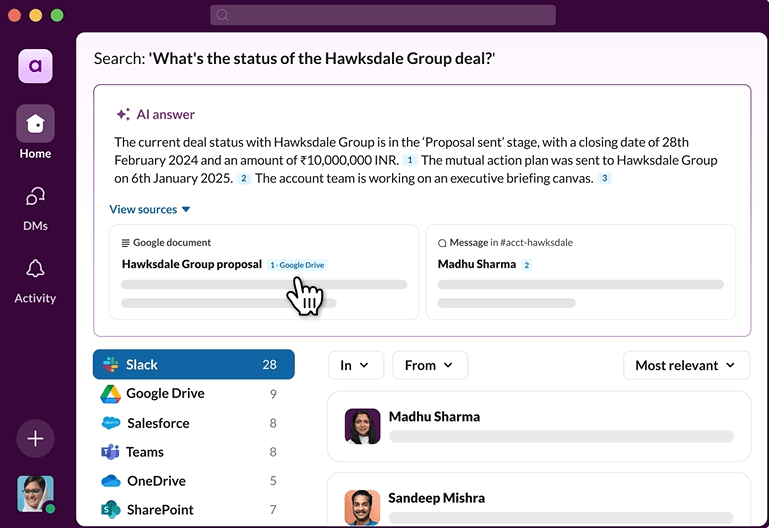
Standout features:
- AI-summarizations: Generates instant summaries of conversations, threads, and shared files (e.g., PDFs and spreadsheets), highlighting key details.
- AI-powered search: Uses generative AI to provide direct answers with citations referring to source materials, so teams can locate policies and past decisions easily.
- AI translations and explanations: Helps users understand complex topics, jargon, or acronyms, across cultures and languages.
- Enterprise search: Enterprise plans extend these capabilities with enterprise search, pulling data from external tools, such as Google Drive or GitHub.
Pros:
- Feature-rich mobile app: The mobile app offers most desktop features and an intuitive UI, so users can stay connected while switching between devices.
- Enterprise-level data privacy: AI runs on Slack’s infrastructure, and customer data is never shared with external LLM providers.
Cons:
- Expensive AI access: Advanced AI features are only available on higher-tier plans, increasing expenses.
- Limited advanced tools: No built-in screen recording or whiteboarding during Huddles.
Pricing:
While Slack offers a Free Forever plan, its AI features are only available on the following paid tiers:
- Pro: $7.25/user/month with basic AI.
- Business+: $15/user/month with advanced AI.
- Enterprise+: Custom pricing, with enterprise-grade AI.
10. Unbabel: Best for multilingual CX with human-in-the-loop AI translation
Unbabel is a language operations platform that combines AI-driven translation with human editing to provide businesses with seamless multilingual content.
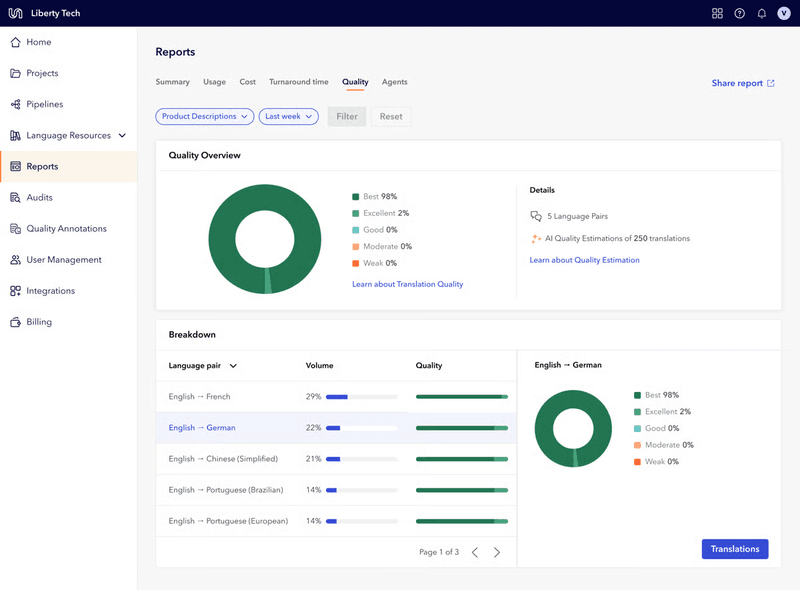
Standout features:
- AI-powered translation: Translates customer communications instantly across channels like email, chat, and FAQs. Human editors then refine the AI translations for cultural and contextual accuracy.
- Quality scoring system: With real-time scoring, Unbabel evaluates translations as they happen, giving teams insight into accuracy and areas for improvement.
Pros:
- CRM integrations: Works directly within tools like Zendesk, helping support agents manage conversations in multiple languages.
- Flexible workflows: Adjusts translation settings to prioritize speed, cost savings, or quality.
Cons:
- Inconsistent translation quality: Complex content often requires additional human intervention, leading to delays and occasional inaccuracies.
- Customer support challenges: Users report slow response times and limited resolution for translation issues.
Pricing:
- Pay-as-you-go: Starts at $0.00020/word, no minimum commitment.
- Starter: $0.00018/word, $10,000 annual minimum.
- Standard: $0.00017/word, $30,000 annual minimum.
- Enterprise: $0.00015/word, $120,000 annual minimum.
Put AI to work in your SaaS stack
Even if you’re not ready to build AI into your product, you can still use it to grow your SaaS business. Start small, testing one or two AI SaaS tools that improve internal workflows, deliver clear insights, automate repetitive tasks, or enhance customer experiences. Just like the ones we’ve explored above.
By being selective, you’ll avoid tech bloat while building a powerful AI stack that supports smarter, data-driven decision-making.
Curious to see how AI can help your team? Book a Userpilot demo to see its AI capabilities in action.
FAQ
What is SaaS with AI?
SaaS with AI combines cloud-based software with AI-powered tools like machine learning, natural language processing, and predictive analytics. This allows businesses to access AI capabilities without heavy infrastructure or specialized expertise.
With SaaS AI tools, companies can boost customer satisfaction by personalizing interactions, automating customer relationship management tasks, and running analytics to understand behavior.
What are the 4 types of AI tools?
The 4 main types of AI tools are:
- Reactive machines: A task-specific AI that responds to input with predefined outputs. E.g., IBM’s Deep Blue, a chess AI, analyzes the current board but doesn’t use historical data to inform future moves.
- Limited memory: An AI that learns from past data to adjust its behavior and improve decisions. E.g., self-driving cars analyzing data on road conditions and adjusting speed or direction.
- Theory of mind: A hypothetical AI that could understand human emotions and intentions, allowing it to predict behavior more accurately.
- Self-awareness: An AI with conscious understanding of its existence and emotions, which is not yet possible.
How many SaaS companies use AI?
70% of SaaS companies are currently using AI technology in their products. Additionally, the AI SaaS market, valued at $71.54 billion in 2024, is expected to grow to $775.44 billion by 2031, with a CAGR of 38.28%.

